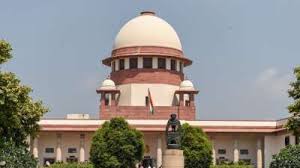
Demand to amend SC decision in 2G spectrum
Demand to amend SC decision in 2G spectrum
GS-2: Governance
(IAS/UPPCS)
Relevant for Prelims:
2-G spectrum case, first-come-first-served policy, Central Vigilance Commission, CBI.
Relevant for Mains:
2-G spectrum case, Central Government's demands and arguments, Supreme Court's decision, Telecom Act-2023, Conclusion.
26/04/2024
Source: TH
Why in news:
Recently, the Central Government has sought 'clarification' on the Supreme Court's verdict on the 2-G spectrum scam.
- The Supreme Court had determined in 2012 that 2G spectrum could only be allocated through auction for the sake of transparency and fairness. This is why the Center has challenged it.
About 2-G Spectrum:
The 2-G spectrum allocation scam took place in the year 2008 when the then government had sold 122 2-G licenses to specific telecom operators on a 'first-come-first-served' basis.
Scam allegations:
- In its charge sheet filed in April 2011, on the instructions of the Central Vigilance Commission, the Central Bureau of Investigation (CBI) had alleged a loss of ₹30,984 crore to the exchequer as a result of anomalies in the allocation process.
Public interest litigation(PIL):
- The Center for Public Interest Litigation and Subramanian Swamy had filed a petition in the Supreme Court in 2008 alleging a ₹70,000 crore scam in granting telecom licenses.
Supreme Court Decision:
- In February 2012, a division bench of the Supreme Court canceled the allotted licenses, arguing that the 'first come, first served' basis for allocating scarce natural resources could be misused.
- Spectrum, considered a scarce natural resource, was ordered by the Supreme Court to be allocated through a fair and transparent process of auction.
- In this judgment the Supreme Court emphasized that the onus is on the State to ensure that the 'non-discriminatory method' of auction is adopted by giving wide publicity so that all eligible persons can participate in the process.
Central government's argument:
- More than a decade after the Supreme Court canceled 122 telecom licenses in the 2-G spectrum scam verdict, the Central government filed an application to allot 'certain classes' of spectrum through administrative processes instead of competitive auction.
- Administrative allocation would mean that the government would have the final say in deciding the process of selection of operators.
- According to the Central Government, allocation of spectrum is necessary for commercial telecommunication services as well as for discharging sovereign and public interest functions like security and disaster preparedness.
- The following demands have been made by the Central Government in the petition
- Issue appropriate clarification that the Government may consider assignment of spectrum through administrative process if so determined through due process as per law.
- If such assignment is for the fulfillment of government functions or in public interest.
- If in such assignments the auction process cannot be preferred due to technical or economic reasons.
- The Central Government has also referred to the observations made by the Constitution Bench while deciding the Presidential reference in respect of the February 2012 judgment.
- In this, the Constitution Bench had remarked that the auction method prescribed in the judgment should not be considered a 'constitutional mandate' for transfer of natural resources except spectrum.
Provisions under Telecom Act-2023:
- The Act empowers entities listed in the First Schedule to allocate spectrum for telecommunications through administrative processes other than auctions.
- These include national security, defense and law enforcement, as well as organizations engaged in global mobile personal communications via satellite, such as SpaceX and Bharti Airtel-backed OneWeb.
- Under this, the government can also assign that part of the spectrum which has already been assigned to one or more additional entities which is known as secondary assignment.
Conclusion:
- The 2G spectrum case was a political controversy in which the Central Government has sought a logical amendment to the decision given by the Supreme Court. This demand of the government will prove to be an important step when this demand is socially, economically and technically justifiable.
---------------------------------------------------
Mains Question:
Discuss the Centre's arguments seeking modification of the SC decision in 2G spectrum.